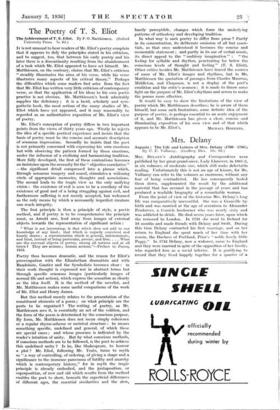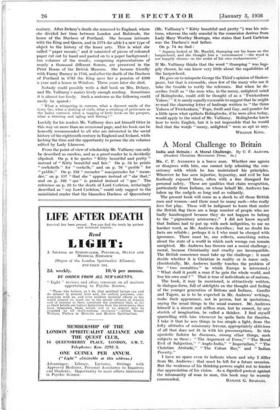Aspasia : The Life and Letters of Mrs. Delany (1700-1788)4
By C. E. Vulliamy. (Geoffrey lies. 10s. 6d.)
Mrs. Delany
Aspasia : The Life and Letters of Mrs. Delany (1700-1788)4 By C. E. Vulliamy. (Geoffrey lies. 10s. 6d.)
MRS. DELANY'S Autobiography and Correspondence were published by her great-grand-niece, Lady Llanover, in 1861-2, in six volumes, of moderate size, which still make delectable reading. Unfortunately this is not an age of leisure, for Mr. Vulliamy can refer to the volumes as enormous, without any fear of being contradicted. He has consequently boiled them down, supplemented the result by the additional material that has accrued in the passage of years and has produced a readable biography of a remarkable woman.
From the point of view of the historian Mrs. Delany's long life was comparatively uneventful. She was a Granville by birth and was married at the age of seventeen to Alexander Pendarves, a Cornish landowner who -was nearly sixty and was addicted to drink. He died seven years later, upon which she removed to London. In 1731 she went to Ireland for 18 months and made friends with Delany and Swift. During this time Delany contracted his first marriage, and on her return to England she spent much of her time with her cousin, the Duchess of Portland, Prior's "noble lovely little Peggy." In 1743 Delany, now a widower, came to England and they were married in spite of the opposition of her family, who regarded him as a social inferior. It is gratifying to record that they lived happily together for a quarter of a
century. After Delany's death she removed to England, where she divided her time between London and Bulstrode, the home of the Duchess of Portland. She became intimate with the King and Queen, and in 1774 she addei a new type of object to the history of the lesser arts. This is what she called "paper mosaic," and it consisted of pieces of coloured paper cut out by hand and pasted on to a paper background ; ten volumes of the results, comprising representations of nearly a thousand different flowers, are preserved in the Print Room of the British Museum. She became friendly with Fanny Burney in 1783, and after the death of the Duchess of Portland in 1785 the King gave her a pension of £300 a year and a house in Windsor. Three years later she died.
Nobody could possibly write a dull book on Mrs. Delany, and Mr. Vulliamy's makes lively enough reading. Sometimes it is almost too lively. Such a sentence as the following could easily be spared :
"What a whispering in corners, what a discreet rattle of the ivory fan, what a shaking of curls, what a swishing of petticoats as the ladies curtsied, what a tapping of little heels on the parquet, what a tittering and ogling and flirting ! "
Luckily for his readers Mr. Vulliamy does not himself titter in this way on more than an occasional page, and his book can be honestly recommended to all who are interested in the social history of the eighteenth century in England and Ireland, while lacking the time and the opportunity to peruse the six volumes edited by Lady Llanover.
From the point of view of scholarship Mr. Vulliamy can only be described as careless, and as a proof-reader he is decidedly slipshod. On p. 4 he quotes "Kitty beautiful and pretty" instead of "Kitty beautiful and fair." On p. 54 he prints " cockshells " for " cockells," and on p. 76 " peeble " for "pebble." On p. 132 " menader " masquerades for "mean- der," on p. 157 "that she" appears instead of "she that," and on p. 193 " qui " is printed instead of " que." The reference on p. 33 to the death of Lord Carleton, irritatingly described as "my Lord Carleton," could only suggest to the uninitiated reader that the blameless Duchess of Queensbury (Mr. Vulliamy's "Kitty beautiful and pretty ") was his mis- tress, whereas the only scandal in the connexion derives from Lady Mary Wortley Montagu, who states that Lord Carleton was the Duchess's real father.
On p.74 we find :
" Aspasia looked at Mr. Handel, thumping out his basso on the harpsichord, and she thought him a 'necromancer '—the word is not happily chosen—in the midst of his own enchantments."
If Mr. Vulliamy thinks that the word " thumping " was hati- pily chosen, he can know very little about the capabilities of the harpsichord.
He goes on to misquote George the Third's opinion of Shakes- peare, but that is excusable, since few of the many who use it take the trouble to verify the reference. But when he de- scribes Swift as "the man who, in the messy, unlighted mind of Bolingbroke, could still be thought of as a 'Twickenham Yahoo,' " it is surely equally excusable to suggest that he might re-read the charming letter of badinage written to "the three Yahoos of Twickenham," Pope, Swift and Gay, and ponder for a little upon what epithets Bolingbroke, if he were alive today, would apply to the mind of Mr. Vulliamy. Bolingbroke knew how to write English, but it is not impossible that he would find that the woryls "messy, unlighted" were as apt as any.
WILLIAM KING.











































 Previous page
Previous page